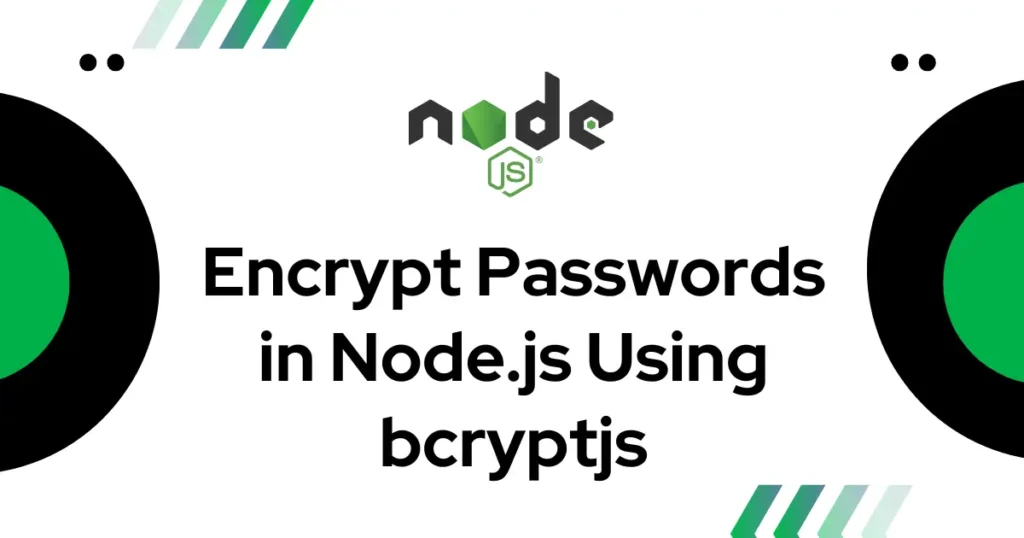Securing user passwords is perhaps the most important web application security measure. In the development of authentication systems, it is not a good idea to store plain-text passwords in your database directly. Instead, you need to encrypt or hash the passwords before saving them. In this guide, you’ll learn how to encrypt passwords in Node.js using bcryptjs.
The bcryptjs module provides an simple yet effective way to encrypt and verify passwords, ensuring your users’ sensitive information stays safe even if your database is hacked. By the end, you will understand Node.js password encryption using bcryptjs, its installation, and practical examples that demonstrate how to secure user credentials in real-world scenarios.
What is bcryptjs?
bcryptjs is a slim JavaScript library for Node.js to hash passwords, and it is based on the bcrypt algorithm that salts passwords prior to hashing. It generates the password impossible to reverse-engineer even if someone gains access to your database.
Unlike normal encryption, hashing using bcryptjs cannot decrypt. Instead, it checks the password by matching the entered password hash with the stored hash. This method is used extensively in the applications of today, ranging from basic login systems to enterprise-grade platforms such as e-commerce websites and online banking websites.
Installing bcryptjs in Node.js
To start secure password hashing using Node.js and bcryptjs, you first need to install the bcrypt module. Open your terminal in the project directory and execute:
npm install bcryptjsOnce installed, you can import encrypting passwords or sensitive information it into your Node.js application using simple import statement like showing in below example.
const bcrypt = require('bcryptjs');Encrypting Passwords with bcryptjs in Node.js
Let’s have a look at an example showing how to hash passwords before storing them on your database. You have a user registration feature. When users register, their passwords need to be hashed for secure storage.
const bcrypt = require('bcryptjs');
const password = 'mySecretPassword';
bcrypt.genSalt(10, (err, salt) => {
bcrypt.hash(password, salt, (err, hashedPassword) => {
console.log('Hashed Password:', hashedPassword);
});
});Output:
Hashed Password: $2a$10$7y5vF5Z3WZKbz.6A5X7O3uU0xkY5xqZt2Jx6IvJ8lLUPb1f8K2kz6Here, the genSalt function generates a salt that adds randomness, and the hash function creates the encrypted version of the password. Each password gets a unique hash, even if two users have the same password.
Checking or Matching Passwords with bcryptjs in Node.js
During authentication, you will need to compare the entered password with the stored hash in your database. bcryptjs offers a simple method to perform this comparison.
const bcrypt = require('bcryptjs');
const storedHash = '$2a$10$AD8w9Dq1QvQq9MPLQnV9kuS6eB9U7WbW/XcO/FSxH4eToUav7gIKG';
const enteredPassword = 'mySecretPassword';
bcrypt.compare(enteredPassword, storedHash, (err, result) => {
if (result) {
console.log('Password matched');
} else {
console.log('Invalid password');
}
});In this example, bcrypt.compare() compares the input password with the stored hash. If it returns true, the system grants access otherwise denies it. The approach keeps users authenticated without revealing their real passwords.
Conclusion
Password encryption is crucial for the development of secure web applications. With bcryptjs password encryption, you can safely safeguard user credentials from possible data breaches. The bcryptjs library within Node.js is easy to implement, lightweight, and well-respected for dealing with password security.
By having password hashing in Node.js, you’re not merely introducing encryption but strengthening the integrity of your application’s authentication. You might be building small projects or bigger enterprise applications, but with or without, implementing bcryptjs is essential for upholding user faith and data security. If you wish to know more about how Node.js handles various processes, read this informative guide on Working with Process in Node.js.

